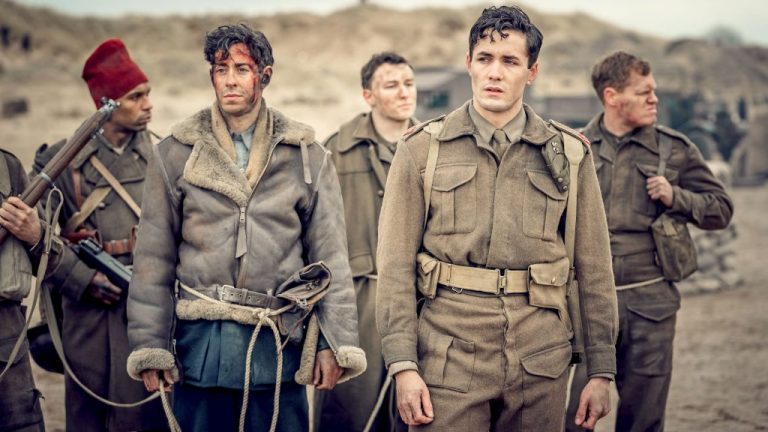World on Fire Returns People of Color to the Dunkirk Narrative
World On Fire places back in the picture the black soldiers’ other wartime dramas erased.

World on Fire fans may wonder why the fifth episode is essentially re-treading a story already told recently in Dunkirk, Their Finest, and other previous dramas. Previous World on Fire episodes already established Connie (Yrsa Daley-Ward) and Albert (Parker Sawyers) as major characters of color. On the road towards Dunkirk, the audience is also introduced to Connie’s husband Eddie Knight (Ansu Kabia), as well as black members of the British army and naval forces. As Harry Chase (Jonah Hauer-King) leads his unit to evacuation, he finds new characters that connect existing plotlines together and returns people of color to their rightful place in wartime history.
Denba (Buom Thingang) and Ibrahim (Lionel Desmazon) are French soldiers from Senegal. They were separated from their unit and encountered injured British troops. One can surmise their unit either was fired upon by the Germans and they were lost in the chaos, or their commanding officers prioritized the white members and their safety was not considered a priority. Throughout their journey to the coast, it is clear that their survival depends on others putting aside learned racism and nationalism.
In an interview for the BBC, screenwriter Peter Bowker said: “I deliberately set out to tell stories that weren’t traditional war stories. I wanted to write about what it was like to be a Senegalese soldier who found himself at Dunkirk….They struck me as stories that have remained largely untold, but also struck me as contemporary in our current preoccupations with nationality and borders and refugees, and what constitutes a genuine refugee and what constitutes genuine need.”
Although fans may question the connection between Demba and Ibrahim and modern political debates around immigration and racism, their journey to survive Dunkirk highlights the role European colonization pre-World War II played in making the war a truly global conflict. This is especially important in the light of recent controversies in the UK media where actor Laurence Fox wrongfully criticized 1917 for featuring Sikh soldiers fighting for the British army. (If his picture seems somewhat familiar, you may recall his roles on Masterpieces’ Inspector Lewis and Victoria, but his racist comments in the UK media may prevent a return to the industry.)
Both the British and French used troops from their colonies in Asia, the Caribbean, and Africa to enlarge their forces, especially as the war expanded to North Africa, Japan, and Italy. The British Indian Army was critical in repelling Mussolini from Libya and Tunisia. Troops from West Africa helped the British recapture Burma (now Myanmar) from the Japanese but they are often referred to as the “forgotten army” because their contributions were frequently overlooked. It is too soon to tell what stories the show will tell in future episodes, but we can expect less whitewashing.
In 2002, American war film Red Tails depicted the famous Tuskeegee Airmen and their share in African-American military participation during World War II, but their campaigns took place after Dunkirk. Small Island, which aired a decade ago on Masterpiece, examined the racism Jamaican recruits experienced from both the British army and Americans imposing segregation on the UK homefront. World on Fire not only shifts away from the American perspective on the war, but it also clarifies the question of what roles soldiers of color were allowed to have in the British and French forces. The Royal Air Force heavily restricted black soldiers to support positions, but the British Army used black soldiers in infantry units.
As Denba and Ibrahim make their way to the coast as part of Harry’s unit, their story shifts towards a narrative of collective survival and grit. We can see their motivation to break protocol was out of a sense of duty to care for soldiers who could not help themselves. Harry finds out about a slice of their life before the war because he can speak French. Songs and sign language keep morale up while the men are jumpy from the German bombs and airplanes. Regardless of where these soldiers came from, they are all allies against the Nazis. All must defy the propaganda sheets that rain down from above calling for the French and British to surrender.
While Episode 5 depicts black soldiers in the infantry and in ground support roles, the show does not shy away from showing prejudice based on race or nationality. A British naval officer gives Eddie Knight a side-eye before he’s taken to safety as well. British naval officers push back a desperate Gregorz Tomaszeki (Mateusz Więcławek) from boarding a boat. The most dramatic confrontation is when Harry, Denba and Ibrahim are ready to board the evacuation boat. The men in charge are fine with having the shellshocked British soldiers but they refuse to credit Denba and Ibrahim with helping the injured. Harry has to fire his gun to put his foot down against racism and petty squabbling over the chain of command. Some may argue Harry’s intervention creates a white savior narrative, however black soldiers were rarely promoted to officers. In addition, Harry refused to see himself as a hero. His main objective is to ensure soldiers were not left behind.
Fans can hope World On Fire would tell the story of Denba and Ibrahim’s recovery and return to Senegal. Even if the story turns in another direction, those in favor of more racial diversity in period dramas and in World War II stories can still track Connie, Eddie, and Albert’s stories.
